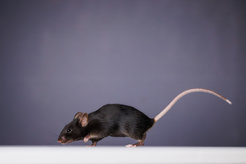Circuits for Instinctive Behavior in Mice
Instinctive behaviors-such as hunting, flight, aggression, and mating-constitute a survival toolkit that animals acquire with little or no experience. In vertebrates, these behaviors are generated by remarkably conserved circuits in the brain that are very similar between humans and mice, ensuring their survival.
To understand the mechanisms of information processing in the brain that contribute to the emergence of instinctive behaviors, we use the house mouse (Mus musculus) as a model organism. House mice are not only excellent survivors, but also allow the precise analysis of defined neural circuits using modern genetic methods. Specifically, we investigate how internal states and experiences such as stress, hunger, or the reproductive cycle affect instinctive behaviors. The goal of this research approach is to contribute to our understanding of the information processing in the brain that underlies both adaptive and maladaptive behaviors.
The function of the circuits that generate instinctive behaviors such as escape is altered in many psychiatric disorders, such as anxiety. We therefore expect that this basic research will provide important insights that, due to their high evolutionary conservation, can be translated to humans and contribute to the understanding of the pathophysiology of neuropsychiatric disorders.

